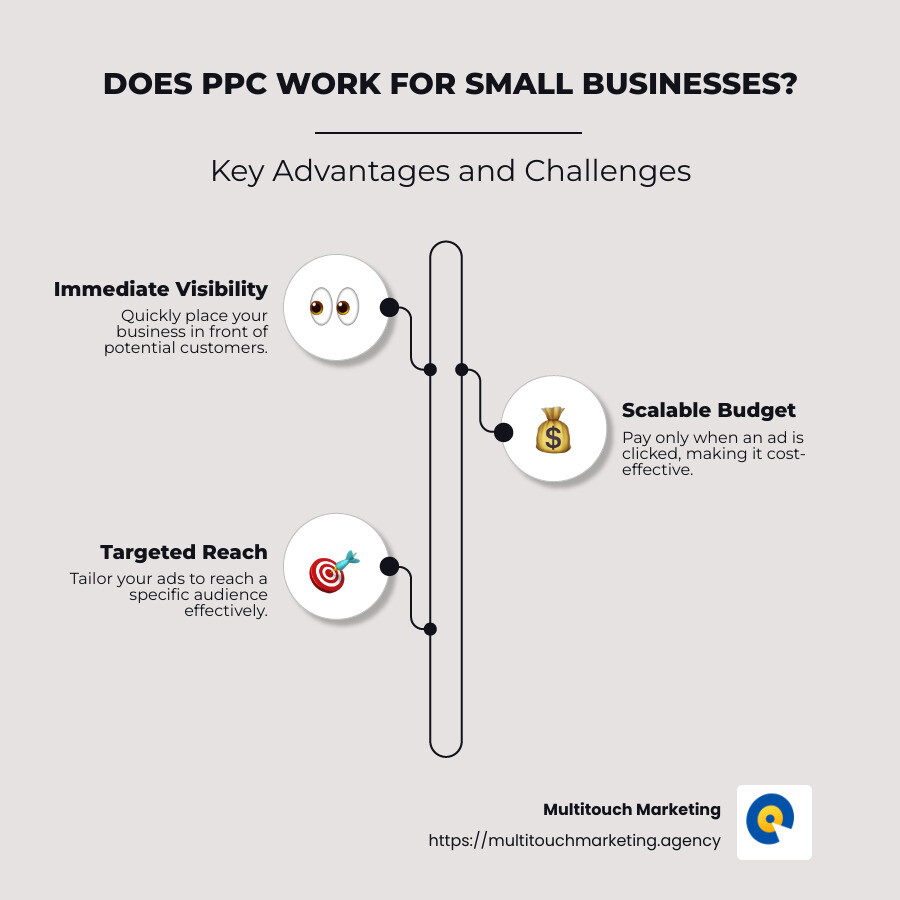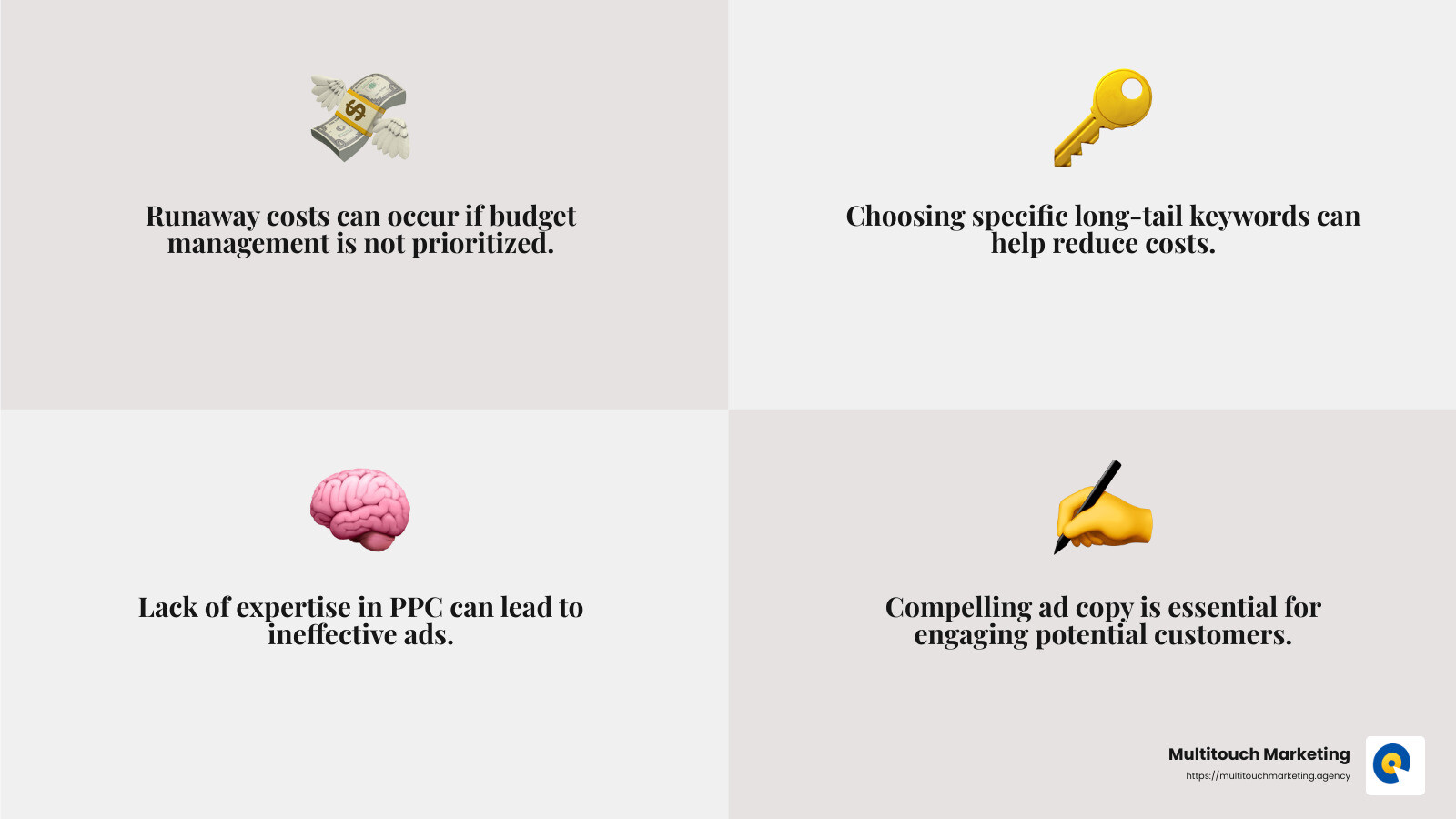
Does PPC Work for Small Businesses? 5 Proven Benefits
Does PPC work for small businesses? The short answer is yes, but it’s not without its challenges. Here’s a quick breakdown:
- Immediate visibility: PPC can quickly place your business in front of potential customers.
- Scalable budget: You only pay when an ad is clicked, making it cost-effective when managed correctly.
- Targeted reach: Tailor your ads to reach a specific audience.
For small business owners already juggling various tasks, navigating PPC advertising can be daunting. The challenge lies in optimizing ad spend to ensure a solid return on investment while juggling a limited budget. This makes a strategic approach crucial. Managing costs effectively and selecting the right keywords can help open up the potential of PPC and bring tangible benefits.
My name is Milton Brown, and I’ve been guiding small businesses through the intricacies of PPC for over a decade. I specialize in ensuring that businesses, regardless of size, can effectively use PPC to improve their online presence. I’ll explore the problems and advantages of PPC as we move toward a successful campaign strategy.
Understanding PPC for Small Businesses
Does PPC Work for Small Businesses?
Absolutely, PPC works for small businesses. It offers a fast track to getting noticed online, especially when competing with larger companies. The pay-per-click model means you only pay when someone clicks your ad, which can be a game changer for budget-conscious small businesses.
PPC campaigns can be launched on major search engine platforms like Google and Bing. These platforms allow your ads to show up when users search for specific keywords related to your products or services. The beauty of this model is its flexibility. You can set a budget that fits your needs, and adjust as you see results.
But here’s the catch: the cost-per-click (CPC) rates can vary. Some keywords are more expensive than others due to competition. This means choosing the right keywords is crucial. Opting for long-tail keywords can often yield better results for less money.
The Benefits of PPC for Small Businesses
The benefits of PPC for small businesses are numerous:
-
Immediate Visibility: Unlike SEO, which can take months to show results, PPC can put your business on the map right away. Your ads can start attracting clicks and generating traffic almost as soon as they go live.
-
Traffic Generation: PPC is a powerful tool for driving traffic to your website. In fact, visitors who arrive via PPC ads are 50% more likely to make a purchase than those who come through organic search.
-
Brand Awareness: Even if users don’t click on your ads, seeing your brand on the search results page can increase brand recognition. This is especially valuable for new businesses trying to establish their presence.
-
Targeted Advertising: PPC allows you to target specific demographics, locations, and even times of day. This level of targeting ensures your ads reach the people most likely to be interested in your products or services.
-
Lead Generation: By directing potential customers to a well-optimized landing page, PPC can help generate high-quality leads. This means not just more traffic, but more conversions and sales.
-
Increased Sales: With the right strategy, PPC can lead to a significant increase in sales. By targeting the right audience and continuously refining your ads, you can maximize your return on investment.
In conclusion, while PPC requires careful planning and management, it offers small businesses a unique opportunity to compete in the digital marketplace. With immediate visibility and targeted reach, PPC can drive traffic, boost brand awareness, and generate leads, ultimately leading to increased sales.
Challenges and Considerations
Common Pitfalls in PPC Campaigns
Running a successful PPC campaign is like baking a cake; it requires the right ingredients and careful attention. However, many small businesses stumble into common pitfalls that can turn their PPC efforts sour.
Runaway Costs: A challenge is managing costs. Without proper budget management, expenses can quickly spiral out of control. It’s easy to overspend on expensive search terms without seeing a return. Careful monitoring and regular adjustments are essential to keep spending in check.
Keyword Selection: Choosing the right keywords is crucial. Many businesses fall into the trap of selecting broad or generic keywords that are highly competitive and costly. Instead, focus on long-tail keywords that are more specific and often less expensive.
Lack of Expertise: PPC isn’t just about setting up an ad and letting it run. It requires expertise to craft effective campaigns. Many small businesses lack the in-house knowledge to steer the complexities of PPC, leading to ineffective ad copy and poor results.
Ineffective Ad Copy: Writing compelling ad copy is an art. Ads need to grab attention and encourage clicks. Without engaging copy, even the best-targeted ads can fail to convert.
Is PPC Cost-Effective for Your Business?
Determining whether PPC is cost-effective involves a careful ROI analysis. It’s crucial to weigh the costs against the benefits.
High-Margin Items: PPC can be particularly beneficial for businesses selling high-margin items. The higher the profit on each sale, the more room there is to cover advertising costs and still achieve a positive return.
Budget Allocation: Allocating your budget wisely is key. Start with a modest budget and scale up as you see positive results. It’s also important to regularly review and adjust your budget to ensure you’re maximizing your investment.
In summary, while PPC offers tremendous potential, it requires careful consideration and strategy. Avoiding common pitfalls and conducting thorough ROI analysis can help small businesses harness the power of PPC effectively.
How to Implement a Successful PPC Strategy
Integrating PPC with Other Marketing Efforts
Strategic Keyword Selection: Keywords are the backbone of any PPC campaign. Choose wisely! Focus on long-tail keywords that are specific to your business. This not only reduces competition but also targets more qualified leads. Collaborate with your SEO team to align these keywords with your organic search strategy. This synergy improves visibility across both paid and organic search results.
Engaging Ad Copy: Crafting ad copy that captivates is crucial. Your ad should speak directly to the needs of your audience. Think of it as a mini-billboard on a busy highway. Make it catchy but informative. Highlight the unique selling points of your product or service. The goal is to encourage clicks, so be clear and persuasive.
Landing Page Optimization: Once someone clicks your ad, they should land on a page that seals the deal. Your landing page must be relevant and user-friendly. Ensure it matches the ad’s promise and provides a clear call to action. Optimizing landing pages is an ongoing process. Use data analysis to understand user behavior and make improvements.
SEO Integration: PPC and SEO are two sides of the same coin. Integrating these strategies can amplify your marketing efforts. Use PPC data to inform your SEO strategy. For instance, successful PPC keywords can guide your organic content creation. This integration helps in maximizing your online presence.
Social Media Synergy: Don’t forget about social media! Use insights from your PPC campaigns to improve your social media strategy. Identify which demographics engage most with your ads and tailor your social media content accordingly. This synergy can increase brand awareness and drive more traffic.
Monitoring and Adjusting Your PPC Campaign
Performance Tracking: Keep a close eye on your campaign’s performance. Use analytics tools to track metrics like click-through rates (CTR) and conversion rates. Understanding these metrics helps in identifying what’s working and what needs tweaking.
A/B Testing: Experimentation is key. Conduct A/B tests to compare different versions of your ads. Test variables like headlines, images, and calls to action. This iterative approach helps in refining your strategy for better results.
Budget Adjustments: Regularly review your budget allocation. If certain campaigns or keywords are performing well, consider reallocating more budget to them. Conversely, reduce spending on underperforming areas. Flexibility in budget management ensures you’re getting the most out of your investment.
Integrating PPC with other marketing efforts and continuously monitoring your campaigns is essential. By doing so, you can optimize your strategy and achieve a higher return on investment.
Frequently Asked Questions about PPC for Small Businesses
Does PPC work for small businesses?
Absolutely, PPC can work wonders for small businesses. It offers immediate visibility and a chance to compete with larger companies. By targeting specific keywords and demographics, small businesses can reach their ideal customers more efficiently.
A study highlighted in our research shows that PPC campaigns can increase brand awareness by up to 80%. This is crucial for small businesses looking to establish themselves in a crowded market. By focusing on niche keywords and local targeting, small businesses can drive relevant traffic to their websites, boosting both lead generation and sales.
What is the downside to PPC?
While PPC has many benefits, there are some potential downsides to consider. The most significant risk is runaway costs. Without careful management, costs can spiral out of control, especially if you’re targeting expensive search terms. This is why budget management and strategic keyword selection are vital.
Another challenge is the need for expertise. Setting up and managing a PPC campaign requires a good understanding of the platform and the ability to analyze data effectively. Many small businesses may not have the resources or time to manage this in-house, leading to the need for external help, which can add to costs.
How effective is PPC advertising?
PPC advertising is incredibly effective when executed correctly. It allows businesses to see immediate results, unlike SEO, which can take time to build momentum. With PPC, you can quickly test different strategies and see what works best for your audience.
The conversion rates for PPC campaigns are often higher compared to other forms of advertising. This is because PPC ads are highly targeted, ensuring that only interested users click through to your site. However, the effectiveness of PPC relies on continuous monitoring and optimization to ensure the best return on investment.
In summary, PPC can be a powerful tool for small businesses, offering quick visibility and targeted reach. However, it requires careful planning and management to avoid potential pitfalls and maximize its effectiveness.
Conclusion
At Multitouch Marketing, we understand that navigating PPC can be daunting for small businesses. That’s why we’re here to provide expert guidance and ensure your PPC campaigns are a success. Our team specializes in crafting custom PPC strategies that align with your unique goals and budget.
PPC campaign success isn’t just about setting up ads and hoping for the best. It involves strategic keyword selection, crafting compelling ad copy, and continuously monitoring performance. We help you avoid common pitfalls like runaway costs and ineffective ad copy, ensuring your investment yields the best possible return.
By partnering with us, you gain access to our expertise and tools that streamline your PPC efforts. We focus on integrating PPC with your broader marketing strategy, combining it with SEO and social media to amplify your reach and impact.
Ready to see how PPC can transform your business? Explore our services and let us help you achieve your marketing goals. Together, we can open up the full potential of your PPC campaigns and drive your business toward greater success.


